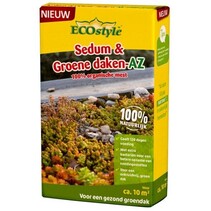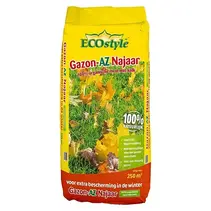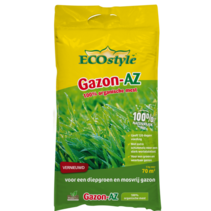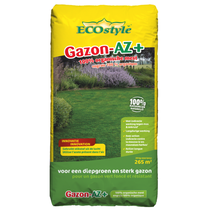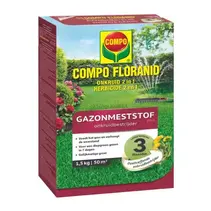Give your plants and lawn the right nutrition for better growth and colour!
- Delivery costs depending on the country
- Snelle Levering (per product vermeld)
- Gratis bezorging vanaf 60 euro
Buying fertiliser?
Why fertilise?
Almost everything that grows and flourishes in your garden needs fertiliser. A lawn, for instance, needs fertiliser in addition to sunlight and water. Grass plants take nutrients from the soil and store them in the root system. If you don't fertilise your lawn, these nutrients will gradually run out. If the soil lacks nutrients, this can cause negative effects on the well-being and appearance of your lawn. The same applies to the plants in your border. Many, often acid-loving plants, could use some extra nutrients such as magnesium and iron. Your fruit and vegetables also do very well when fertilised. Kitchen garden fertiliser usually contains a high level of potassium. This potassium makes for extra large fruits that are a lot healthier and tastier!
Which fertiliser to choose?
Which fertiliser is best to choose depends entirely on the spreading purpose. We therefore distinguish between the following types of fertiliser: lawn fertiliser, garden fertiliser, professional fertiliser and soil/soil improvers. When you can use which manure, you can read below. Do not hesitate to consult a Garden Select employee for personal advice, should you still be unsure about a suitable fertiliser.
Lawn fertiliser
Would you like to enjoy a healthy and full lawn for years to come? It may sound unrealistic, but you can still achieve it! And with lawn fertiliser at that. In the worst case, bare spots, weeds and mosses develop among the grass due to a lack of nutrients. To prevent this, it is recommended to fertilise the lawn at least three times a year.
We have various types of fertiliser for the lawn; both organic fertiliser and artificial fertiliser. We also have nitrogen-rich fertilisers. Ideal for boosting your lawn after the winter months. The added nitrogen ensures that grass undergoes a growth spurt. So you maintain a full and vital lawn. We also have potassium-rich lawn fertilisers specifically formulated for autumn, also called autumn fertiliser. This fertiliser boosts the endurance of the lawn by 'hardening' the top layer, as it were. Each nutrient has its own effect.
Garden fertiliser
Garden fertiliser is a fairly broad term. This category includes ornamental and kitchen garden fertilisers, but also think of boxwood fertiliser for box trees and hedges. One of the most commonly used garden fertilisers are cow manure pellets. This fertiliser has a soil-improving effect and can be spread on the lawn, in the border and ornamental garden.
Professional fertiliser
For gardeners and avid gardeners who want to go the extra mile when it comes to maintaining the garden, we also sell professional fertilisers. These fertilisers are characterised by their specific, sophisticated compositions. Professional fertilisers make it possible to provide plants and crops with a very precise nutrient source that perfectly matches their nutritional needs. Professional fertilisers are often used by gardeners, and for good reason! With this fertiliser, you are simply always right.
Soil & ground
The basis of a richly growing and flourishing garden is a healthy soil structure. By enriching the soil with a soil improver, you create healthy growing conditions. An airy, crumbly soil structure is essential not only for plants, but also for grass. This is because it improves the overall water balance of the root system.
When is the best time to fertilise?
You can fertilise your garden as soon as spring is around the corner, the growing season begins and the flowers and (grass) plants wake up from their winter sleep. From March to May - i.e. in early spring - plants need extra nutrition. So fertilise your plants in spring, preferably with an organic-mineral fertiliser such as Culterra Groen 10+4+6. This will give your plants a controlled nutrient flow for at least three months. Only in this way can your plants get through the hot summer months without any problems!
As we mentioned earlier, the lawn also needs nutrition. You can already start spreading lawn lime at the end of February/beginning of March. Lime has a neutralising value. This ensures that the acidity level of the soil is restored. This prevents and represses the growth of moss. It also improves the absorption of the fertiliser you spread later in the year. Speaking of fertilising: The second fertilisation, after the liming, should ideally take place in early summer. Use a (universal) lawn fertiliser that has a long after-effect. Finish the growing season in autumn with autumn fertiliser. If you want to do it right, give your lawn a second lime injection as well.
How to use fertiliser?
I have a fertiliser, but what is the best way to spread it on the lawn? This is a question we get asked a lot from our customers. Do you only have a small garden? Then you can spread the fertiliser granules by hand over the area to be worked on. Do you have a garden larger than a hundred square metres? Then it is better to use a hand spreader or a spreader truck. Not only because it is much easier, but also because the fertiliser granules are then distributed more evenly. This of course only benefits the final spreading result.
Buying fertiliser at Garden Select
Looking for fertiliser for the lawn, the border and/or the vegetable garden? You can always order it cheaply at Garden Select! Because, we have a suitable solution for every garden situation. We only sell the very best brands. Think DCM, ECOStyle and Pokon. To name but a few.








